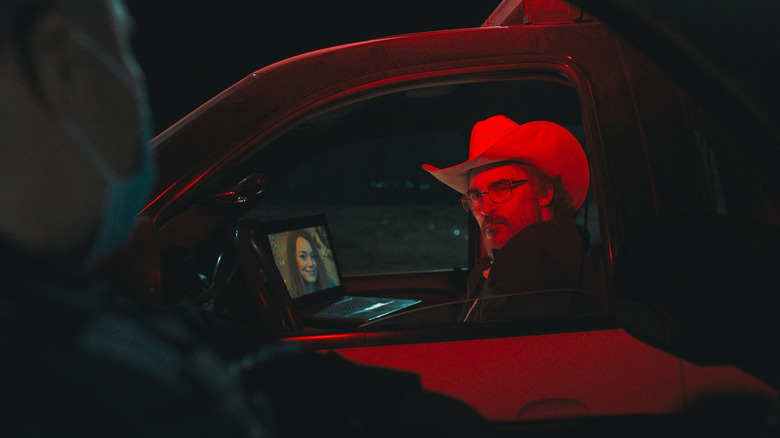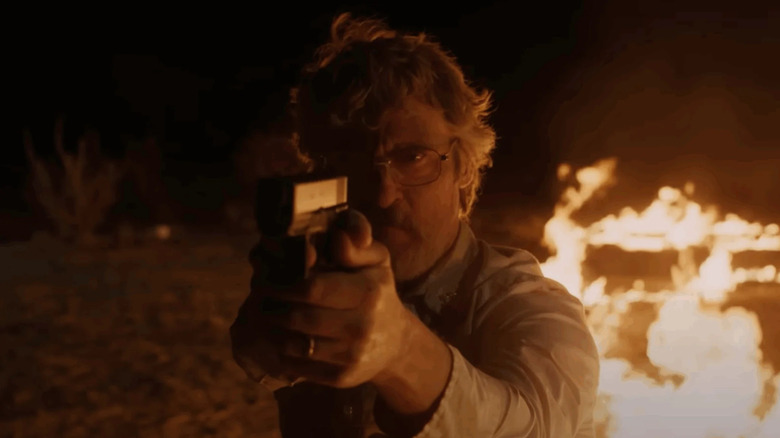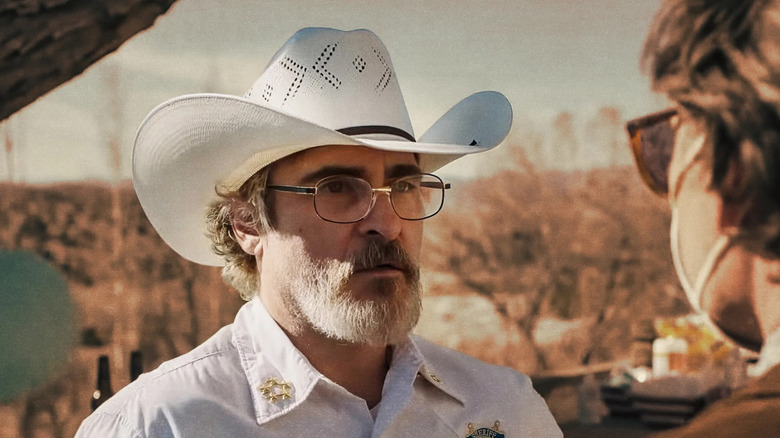Eddington's Mysterious (And Potentially Controversial) Villains Explained
This article contains spoilers for "Eddington."
Although he's only four films deep into his career, filmmaker Ari Aster has already gained a notorious reputation for the way his work includes a heaping helping of ambiguity. From the mysteries surrounding the Graham family's past in "Hereditary" to the question of what (if anything) is real in "Beau Is Afraid," Aster's movies leave a lot of aspects unexplained by their conclusion. His latest film, "Eddington," is no different in this department. Even though it's set in a more recognizably grounded world than his prior films, it's not for lack of any paranoia-inducing (or paranoia-induced) elements. Aster's earlier films follow a protagonist as they are inexorably drawn into an increasingly hostile and surreal world, and the biggest difference with "Eddington" is that this surreal world just happens to closely resemble our reality from the year 2020 and beyond.
Despite deliberately playing with this political and sociological fire, Aster hasn't made a polemic out of "Eddington." Yes, the film can be interpreted in a variety of ways, and either side of the political divide could rather easily make a case for it being a scathing indictment of the opposite group. Yet there's still such ambiguity about many aspects of the film that it can't be officially claimed as standing for either "side," which is a dicey yet fiendishly clever way for Aster to also skirt the issue of the film being a "both sides" venture.
The most controversial example of the way the movie handles these divisive issues lies with the group of villains who intrude upon the climax of the film. Largely unseen and certainly unheard, these assailants can be assumed to be part of Antifa, short for anti-fascist, who are a group of left-wing political activists that make their presence known at protests and other locations of political and social unrest. In right-wing circles, the organization has become a sort of bogeyman figure, with the conspiracy-minded believing they seek to incite violence and riots as part of some destabilization effort.
Although Aster is undeniably riffing on this mythical persona with the inclusion of these apparently left-wing terrorists in the film, their depiction and meaning aren't so clear-cut. In "Eddington," they could be an exaggerated hallucination of the main character, a smoke screen for a shady fictional corporation, or perhaps just a Rorschach test for the audience's own beliefs, as Aster himself seems to indicate.
The Eddington villains as products of Joe's anxieties
Although "Eddington" has an ensemble cast of characters, it's a story that's primarily seen through the eyes of Joe Cross (Joaquin Phoenix), the right-wing sheriff of Eddington, New Mexico who is partially inspired by the inconveniences of the early days of the COVID-19 pandemic to run for mayor. The other reason for his sudden candidacy is his longstanding beef with left-wing incumbent mayor Ted Garcia (Pedro Pascal), which has to do with an incident of assault involving Joe's wife Louise (Emma Stone) that may or may not have happened the way Joe and Louise insist that it did. Joe sees himself as a no-nonsense, common sense type of authority figure, the sort of masculine archetype that's been a cornerstone of the mythology of the American West for centuries. Because of this, Aster positions "Eddington" as a skewed Western, with Joe as the central figure akin to Gary Cooper in the acclaimed western "High Noon" or James Arness in the classic TV series "Gunsmoke."
However, Joe is far from a morally sound person like those examples, as he abuses his power and influence to both assassinate Ted and attempt to cover it up. In a film noir-like fashion, the cracks in Joe's cover-up begin to show, leading to the likely possibility that he's about to be found out by the nearby pueblo's sheriff (David Midthunder). That's when the "Antifa" members show up, helping send the small town that's already been wracked with protests and rioting into further chaos as they capture Joe's deputies, detonate explosives, and create active shooter incidents on the town's open roads.
In other words, this is the twisted version of a typical western movie's shootout sequence with an invading posse of villains, and since Joe is the "hero" of this story, his villains are apparently Antifa soldiers. Yet despite Joe being "saved" by their timely appearance, he does not emerge unscathed — though he's technically still alive at the end of the film, he's become a mute paraplegic due to his injuries, a fitting fate for someone who is publicly hailed as a hero but is known to himself (and the audience) as a less than stalwart person. In this view, the soldiers attacking Joe in the climax of the film might as well be Joe getting his just desserts, a sort of manifestation of the man's paranoid anxieties.
Ari Aster uses the villains as a mirror held up to the audience
Of course, "Eddington" is not just a movie seeking to indict its main character. It's also a film that, rather than point fingers politically, wants to hold a mirror up to the audience (primarily Americans) and have us see what an upsettingly volatile country we've become during the last several years. This goal is something that Aster made a point to call out during a recent interview with /Film's Ethan Anderton, who asked the filmmaker about the Rorschach test of the "Antifa" soldiers. Aster replied:
"And I think maybe the best way of describing what that test is, suddenly at that point, you're either watching a satire or you're watching a dramatization of what was happening at the time. So it was kind of important for me that the film kind of be so gripped by the fever of that kind of thinking that all those things come to really manifest."
Again, Aster is essentially describing the ambiguous nature of these villains, who are only seen prior to their activity in Eddington aboard what appears to be a private jet, making up signs with left-wing slogans. This little glimpse of an explanation as to who and what they are only raises questions about their real purpose and depiction. To Joe (and right-wing leaning audience members), they're the "dramatization" of real-life Antifa members. To left-wing folks, they're a satirization of what Joe and right-wingers believe. Then there's all the possibilities in between those two poles, including the notion that they might simply be wealthy instigators who're looking to hide behind left-wing politics as an excuse to disrupt Eddington and sew chaos for their own reasons.
There's one further potential explanation for the villains' presence, which is that given their obvious wealth and organization, they might be mercenaries hired by the fictional corporation SolidGoldMagiKarp looking to gain a foothold in Eddington in order to build its pricey new data center. Throughout the film, both Joe and Ted seem to agree that SolidGoldMagiKarp's proposal wouldn't be beneficial to Eddington and its citizens, and it's therefore possible that the company sought to clandestinely hire some violent folks in order to destabilize the town enough that it would be willing to accept any offer, which is in fact what ends up happening.
There's no doubt that "Eddington" is a deliberately frustrating film, as Aster is adamant that the movie not have any concrete answers as to its politics, social commentary, or even morality. This means that, uncomfortable as it may be, the villains in the film are totally up to your own definition and interpretation. It seems that the only inescapable and unequivocal answer as to who the "bad guys" in the film are is Americans themselves. Whether you see that as a "both sides" rationalization or not, there's no denying that recently, it increasingly feels like we're all each other's worst enemies.


